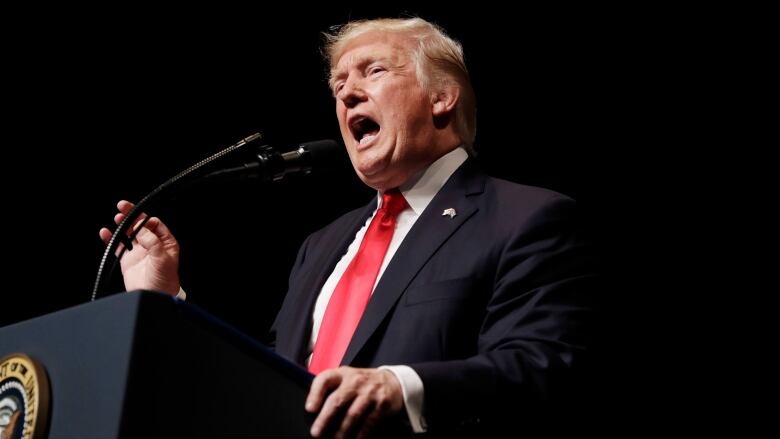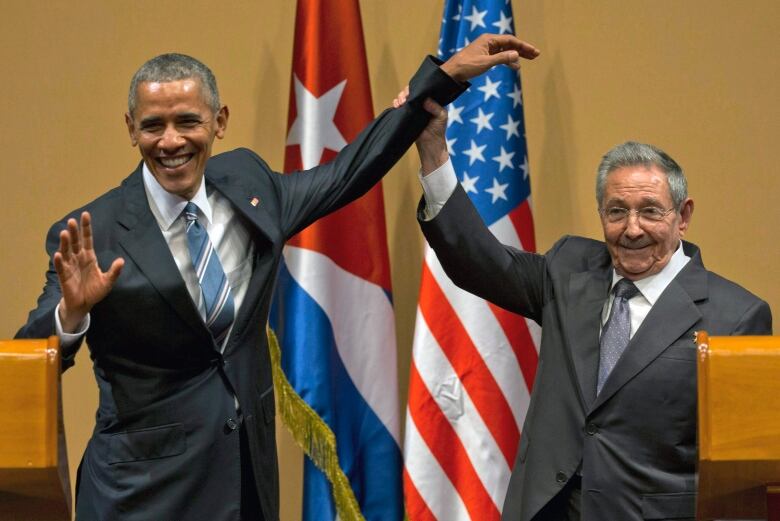Trump hits reset on Obama's Cuba policy, challenges Castro
Cuba secured too many concessions from U.S. in 'misguided' deal made by Obama, Trump says

The Cuban government on Friday denounced U.S. President Donald Trump's new measures to tighten the blockade on the island as a setback in U.S.-Cuban relations, but said it remained willing to continue "respectful dialogue."
In a statement read out on the evening news, the Castro government said Trump was resorting to methods of the past that hurt the Cuban people and prevented economic development but would not weaken the revolution.
Trump announced earlier Friday his partial rollback of the detente initiated by former president Barack Obama, saying he was cancelling the "terrible and misguided deal"with Havana
Trump said Cuba had secured far too many concessions from the U.S. but "now those days are over."
Trump has ordered tighter restrictions on Americans travelling to Cuba and a clamp-down on U.S. business dealings with the Cuban military.
He said penalties on Cuba would remain in place until its government releases political prisoners, stops abusing dissidents and respects freedom of expression.
Headed to Miami to announce new U.S. policy on Cuba. We are going to empower the Cuban people and hold the regime accountable!
—@POTUS"America has rejected the Cuban people's oppressors," Trump said at a speech in Miami."They are rejected officially today rejected."
Though Trump's announcement stops short of a full reversal of the Cuba rapprochement, it targets the travel and economic engagement between the countries that has blossomed in the short time since relations were restored.
Cuba charged Trump with manipulating the topic for "political ends,"adding that the United States was not in a position to give lessons on human rights given its own domestic problems.
However, the Cuban government said the two countries had proven over the past two years that they could co-operate and coexist in a civil manner, respecting their respective differences.
Embassies stay open
The goal is to halt the flow of U.S. cash to the country's military and security services in a bid to increase pressure on Cuba's government.
Embassies in Havana and Washington will remain open. U.S. airlines and cruise ships will still be allowed to serve the island 145 kilometres south of Florida. The "wet foot, dry foot" policy, which once let most Cuban migrants stay if they made it to U.S. soil but was terminated under Obama, will remain terminated. Remittances to Cuba won't be cut off.
But individual "people-to-people" trips by Americans to Cuba, allowed by Obama for the first time in decades, will again be prohibited. And the U.S. government will police other such trips to ensure there's a tour group representative along making sure travellers are pursuing a "full-time schedule of educational exchange activities."
The changes won't go into effect until new documents laying out details are issued.
Once implemented, Trump's policy is expected to curtail U.S. travel by creating a maze of rules for Americans to obey.The policy bans most financial transactions with a yet-unreleased list of entities associated with Cuba's military and state security, including a conglomerate that dominates much of Cuba's economy, such as many hotels, state-run restaurants and tour buses.
By restricting individual U.S. travel to Cuba, the new policy also risks cutting off a major source of income for Cuba's private business sector, which the policy is meant to support.

Under the expected changes, the U.S. will ban American financial transactions with the dozens of enterprises run by the military-linked corporationGAESA, which operates dozens of hotels, tour buses, restaurants and other facilities.
Critics said the changes would only hurt everyday Cubans who work in the private sector and depend on American visitors to help provide for their families. Supporters expressed appreciation for Trump's emphasis on human rights in Cuba.
Restored relations in 2014
Obama announced in December 2014 that he and Cuban leader Raul Castro were restoring diplomatic ties between their countries, arguing that the policy the U.S. had pursued for decades had failed to bring about change and that it was time to try a new approach.
The U.S. severed diplomatic relations with Cuba in 1961 after Fidel Castro's revolution. It spent subsequent decades trying to either overthrow the Cuban government or isolate the island, including toughening an economic embargo first imposed by President Dwight D. Eisenhower. The embargo remains in place and unchanged by Trump's policy. Only the U.S. Congress can lift the embargo, and lawmakers, especially those of Cuban heritage, like SenatorMarco Rubio of Florida, have shown no interest in doing so.
The son of a Cuban immigrant, Rubio opposed Obama's re-engagement with Cuba, saying Obama was making concessions to an "odious regime."
Trump aides said Thursday that Rubio was "very helpful" to the administration as it spent months reviewing the policy. The senator, who challenged Trump for the Republican presidential nomination, was expected to travel with the president aboard Air Force One and appear with him at Friday's announcement.
With files from Reuters












_(720p).jpg)


 OFFICIAL HD MUSIC VIDEO.jpg)
.jpg)



























































































